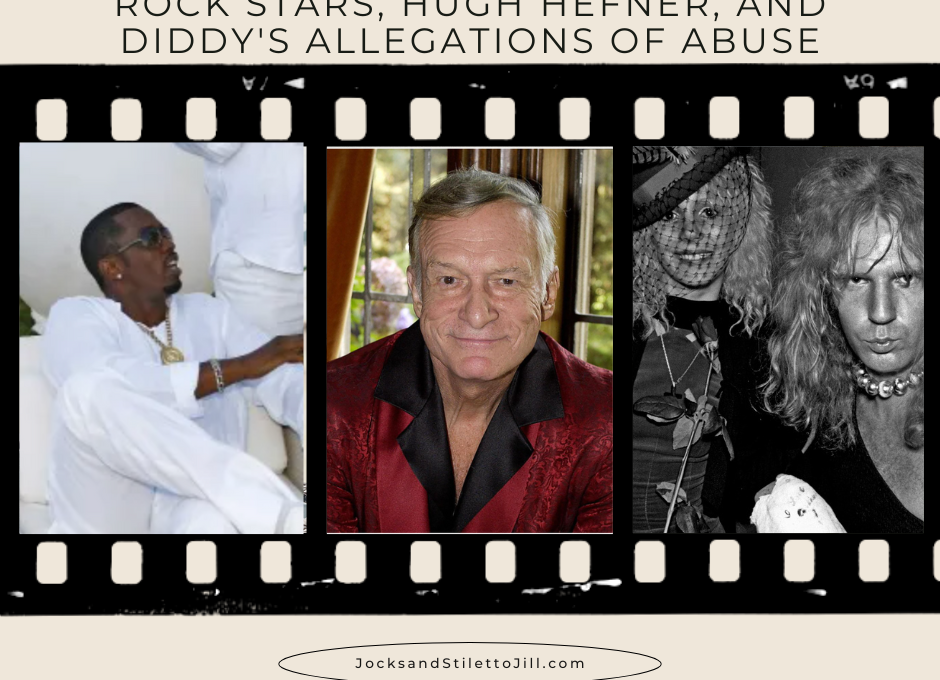The lifestyles of music and media moguls, from rock stars of the 1970s to hip-hop royalty like Sean “Diddy” Combs, have long blurred the lines between power, excess, and exploitation. With current headlines swirling around Diddy’s federal charges of sexual assault and trafficking, the entertainment industry once again finds itself under the microscope.
These accusations come after years of whispers surrounding the former Bad Boy Records CEO, known as much for his legendary white parties as for his music career. But how does Diddy’s lifestyle compare to past figures like Hugh Hefner and the 70s rock scene? Are we witnessing a continuation of a cultural pattern that has existed for decades, with powerful men leveraging their status to engage in questionable behavior under the guise of the “rock star” lifestyle?
The 70s Rock Groupie Movement

To understand the parallels between Diddy’s alleged misconduct and past icons, we must first dive into the 1970s rock era—a time where sex, drugs, and rock ‘n’ roll ruled. Bands like Led Zeppelin, Aerosmith, and Lynyrd Skynyrd were the kings of the scene, and with them came an entourage of young women, many underage, who followed the bands from city to city. These “groupies,” as they were called, became an intrinsic part of rock culture. Pamela Des Barres, one of the most famous groupies of that era, documented her experiences in her memoir *I’m with the Band*. Des Barres writes about her encounters with rock legends like Jimmy Page and Mick Jagger, romanticizing the lifestyle and reflecting on her consensual relationships as a young woman in the scene.
But beneath the glamorized narratives, there were darker undertones. Some of these relationships crossed into territory that today would be deemed abusive or exploitative. For example, rock legends like David Bowie and Steven Tyler were known to have relationships with underage girls—Bowie with Lori Maddox, who was 14 at the time, and Tyler with a teenage groupie he became her legal guardian to continue their relationship. It was a time when societal norms were different, and rock stars operated in a world with few consequences for their behavior. A 1970s magazine called *Star* even featured articles on these underage “groupies,” how-to articles on how to get with the band, and groupie comic strips, often highlighting the escapades of young women trying to sneak into band members’ hotel rooms.
The magazine, which ran through the early 70s, mirrored the cultural acceptability of these behaviors. The rockers themselves weren’t shy about admitting their preferences for younger girls either. Lynyrd Skynyrd’s Ronnie Van Zant famously bragged about his “School Girl” conquests, while Aerosmith’s Steven Tyler referred to his young groupies as “sweet little things.”
Yet, what’s striking is that many of these women, even years later, have expressed that they didn’t see themselves as victims. Pamela Des Barres has frequently emphasized that she felt in control of her choices, arguing that these relationships were consensual and part of the freedom that defined that era. However, the legality and morality of these encounters have come under scrutiny in modern times.
Hugh Hefner’s Playboy Mansion: A Parallel World of Excess

During the same period, another cultural icon built his empire—Hugh Hefner, founder of *Playboy* magazine and his infamous Playboy Mansion. Hefner’s parties were legendary, drawing Hollywood’s elite for nights filled with excess. At the heart of the Playboy ethos was the celebration of female sexuality—but always through a male gaze. Like the rock stars of the 70s, Hefner cultivated an environment where women were both the main attraction and the commodities. His mansion became the site of countless parties that often involved underage women, drugs, and allegations of coercion.
In recent years, with the #MeToo movement and the subsequent reassessment of power dynamics, numerous women have come forward with disturbing stories about what really went down behind the gates of the Playboy Mansion. Women who lived there, such as Holly Madison and others who appeared on *The Girls Next Door*, have shared tales of manipulation, emotional abuse, and pressure to engage in sexual activities they weren’t comfortable with. The allegations against Hefner, much like those against the rock stars of the 70s, highlight how power imbalances can turn what appears consensual on the surface into something far more complicated beneath.








